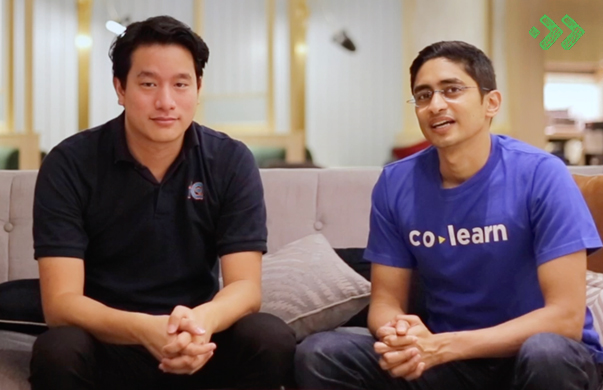Tutoring centers are a popular choice for Indonesian students who are after supplementary lessons outside of school. But now, with Indonesia’s traffic getting worse and the fees for tutoring classes soaring, students are increasingly choosing to go online for their tutorial sessions. Education tech apps are seeing a surge in usage and traffic, and they are eating into the market share of the 619,947 brick-and-mortar tutoring businesses in the country.
But if something works, why not bring it into a new era with some updates? Marc Irawan and Abhay Saboo came up with the idea to provide tutors with the means to conduct their lessons online. The platform is called CoLearn. “Our app makes both teaching and learning easier by offering online classes, as well as livestreamed homework and exam assistance,” said CoLearn’s co-founder and CEO Abhay Saboo in an interview with KrASIA.
Passion for education
Both of CoLearn’s founders care deeply about ensuring the next generation receives the best possible education. Saboo had originally planned to set up a chain of tutoring centers called IQ Education in India in 2008. His friend, Irawan, ran his family’s management consulting business but taught STEM classes for kids on weekends. With their interests aligned, Saboo asked Irawan to help develop the coding content and curriculum for the tutoring centers he intended to open.
“I eventually gave up on the idea during a trip to visit my family in Jakarta. I realized how much I loved Indonesia and decided that this is where I want to build something that would have a positive impact on the country I consider home,” said the Harvard graduate.
Read this: Hla Hla Win of 360⁰ed on bringing holistic change to Myanmar’s education system
Indonesia is the world’s fourth most populous nation, yet its students consistently rank in the bottom 10% in global benchmark tests. This may be partially explained by the fact that less than 15% of parents in the country have attended college, so despite their best intentions, they simply may not know what classes, preparation, or instruction their children need to become more competitive.
Parents tend to send their children to tutoring centers to help them improve their grades. However, not all of them have the time to drive their children to the classes because of their work. For the same reason, they may not be able to help their kids with their studies at home.Saboo realized that phones and tablets, which are already in nearly all households, could bypass that problem. The children could access tutors and materials in the comfort of their homes, according to their own schedules. No travel would be needed.
Irawan loved the idea. With Saboo’s help, he managed to convince his family that taking the plunge with CoLearn was the right thing for him to do.
Assisting tutor centers
CoLearn started by partnering with tutoring centers and providing them with interactive online functionality, such as the infrastructure needed for video classes. But Saboo observed that most students did not find pre-recorded videos to be all that engaging. The content just didn’t have the impact of offline classes.
Unlike other platforms that rely on ready-made video tutorials and online quizzes, CoLearn implements a hybrid of online and offline learning. This way, they can provide a better fit for each student’s needs and preferred learning methods. “For example, some teachers with more expertise and experience may teach larger groups, or, some students may feel more comfortable learning in small groups,” Saboo said.
CoLearn’s app went live in January 2020. It features a practice platform with mock quizzes, giving students the space to learn independently, at their own pace, with hints and solutions to each problem. It also has a dashboard that helps tutors gain a better understanding of each student’s strengths and weaknesses. There are also tutorial videos as well as livestreamed classes.
As its user base grows, the startup is opening the platform to instructors who are not associated with tutoring centers. In just five months, the company has recruited 200 teachers for the platform, with 3,000 student users and 65 tutoring center partners—offering lessons in all subjects. Most of CoLearn’s users are students between elementary school and high school.
CoLearn’s partnerships with tutoring centers, and not only individual tutors, is what makes them stand out from other education tech companies.
Because of COVID-19, schools in Indonesia are closed, so education tech apps have become crucial in many households. CoLearn has seen livestreaming numbers on its platform go up 20 times, and expects even more people to sign up and log on in the coming months.
CoLearn is a member of the third cohort of Sequoia India’s accelerator program, Surge. The company has already received an undisclosed amount of funding from Surge, Alpha JWC Ventures, and AC Ventures. “We aim to become one of Indonesia’s favorite destinations for students in the next six to 12 months,” Irawan said.
In the long term, the pair would like to see students using CoLearn perform in the top of 50% of the benchmark test PISA, so that they are set up to compete on a global level. “Our priority now is to reimagine ourselves for a post-COVID world, so we can maintain and even increase our traction once current restrictions start to ease,” said Saboo.
